

154 Cool and Unusual Things to Do in Paris. Personalized Learning Workbook. How To Write the SEP - HIS PLACE for Help In School. What IS an IEP?
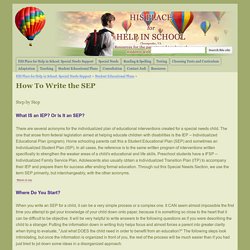
Or Is It an SEP? There are several acronyms for the individualized plan of educational interventions created for a special needs child. The one that arose from federal legislation aimed at helping educate children with disabilities is the IEP -- Individualized Educational Plan (program). Home schooling parents call this a Student Educational Plan (SEP) and sometimes an Individualized Student Plan (ISP). In all cases, the reference is to the same written program of interventions written specifically to strengthen the weaker areas of a child's educational and life skills.
Where Do You Start? When you write an SEP for a child, it can be a very simple process or a complex one. So take some notebook paper and start writing! 1. A. 2. Return to top Setting Annual Goals 1. 2. 3. Accommodations can be and will be important, because they are usually permitted for the child's use on many standardized tests! 4. Writing Student Education Plan Goals for Each Identified Weakness 1.
A. 2. 5117 Campoy Chapter 5. Redefining Readiness from the Inside Out: The Future of Learning. Babies born this year will have graduated from college by 2040 and be entering the workforce.
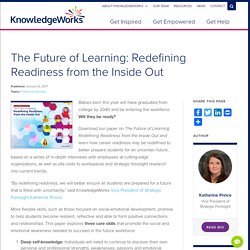
Will they be ready? Download our paper on The Future of Learning: Redefining Readiness from the Inside Out and learn how career readiness may be redefined to better prepare students for an uncertain future, based on a series of in-depth interviews with employees at cutting-edge organizations, as well as site visits to workspaces and strategic foresight research into current trends. “By redefining readiness, we will better ensure all students are prepared for a future that is filled with uncertainty,” said KnowledgeWorks Vice President of Strategic Foresight Katherine Prince. More flexible skills, such as those focused on social-emotional development, promise to help students become resilient, reflective and able to form positive connections and relationships. This paper explores three core skills that promote the social and emotional awareness needed to succeed in the future workforce: Thank you! Preparing All Learners for an Uncertain Future of Work.
By: Katherine Prince Continuous learning, cultural awareness, change expertise, adaptable and effective communication and the ability to learn from failure.
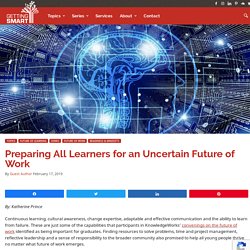
These are just some of the capabilities that participants in KnowledgeWorks’ convenings on the future of work identified as being important for graduates. Finding resources to solve problems, time and project management, reflective leadership and a sense of responsibility to the broader community also promised to help all young people thrive no matter what future of work emerges. That question – what future of work will emerge – is unanswerable, making it critical to help young people, along with other education and employment stakeholders, plan for multiple possible futures. The Future of Work: How Do We Prepare Our Students? Although we cannot predict with certainty the types of jobs that will exist in the future, we know that today’s students will need a variety of skills, “21st century skills.”
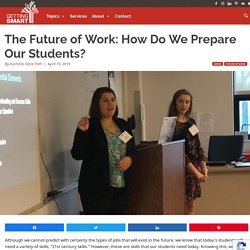
However, these are skills that our students need today. Knowing this, we must ask ourselves what are the best ways to provide all students with authentic, unique, and innovative learning experiences that will foster the development of these essential skills? How can we prepare students for jobs which may not exist yet in our ever-changing world? As an educator of 25 years, I have seen a lot of changes in education. Popular discussions in learning communities focus on teaching methods, the classroom “space,” homework and grading policies, and whether students need a college degree to be successful in the future.
Looking at the changes we have seen in the areas of education and work, I think the best action we can take is to offer specific types of learning experiences for all students. For more, see: : Signaling Work and Learning Readiness in 2030: The Future of Assessment. Signaling Work and Learning Readiness in 2030: The Future of Assessment A Summary of the Colloquium On February 19-20, Institute for the Future partnered with Lumina Foundation to assemble a colloquium of educators, entrepreneurs, and philanthropic leaders to re-envision the ways that learners in the future will signal their skills and competencies for work—and the ways that the marketplace will signal its changing needs for those skills and competencies.
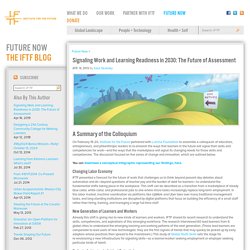
The discussion focused on five zones of change and innovation, which are outlined below. NY Daily News. Future of Jobs 2018.